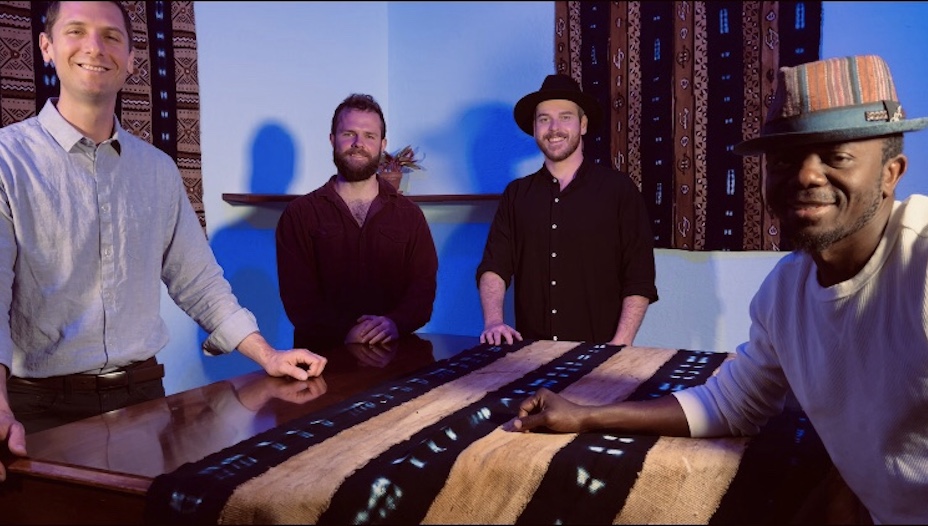By Mat Weir
In the Langala and Lari languages, Mokili Wa means “world, listen.” More than a phrase, it’s a call to arms. A challenge for the world to stop, pause and pay attention to what is happening around us. A chance to listen to our brothers and sisters from different countries and cultures in the realization that we are all one human race.
So it’s only appropriate that Mokili Wa is also the name of a world fusion jam band birthed right here in our wonderfully eclectic Santa Cruz.
“The beautiful thing about Santa Cruz is that they accept world music and cultures,” exclaims bassist Ryan Price. “I love Santa  Cruz because it’s so diverse and so open to different musical genres.”
Cruz because it’s so diverse and so open to different musical genres.”
That diversity is what drives Mokili Wa’s music, combining African beats and melodies with jazz, blues, R&B and Latin fusion. It’s a sound that is distinctly their own. Their music can spark a fire of joy in the heart or sorrowfully touch the soul of anyone within earshot.
It’s an assorted sound that could only come from a group as mixed as their music.
Along with Price, Mokili Wa consists of singer, songwriter and guitarist Elie Mabanza, Spencer Peterson on keys, Joe Rayhbuck on drums and Anne Stafford on sax. In addition to many members having Bay Area or California origins, Mabanza hails from the Democratic Republic of Congo (DRC) and Rayhbuck spent much of his childhood in the Republic of Zaire (now a part of the DRC). The later says it’s these origins that play such an instrumental role in the band’s unique sound.
“In Central Africa everyone sings, everyone dances and everyone plays an instrument,” he explains. “It’s just what everybody does, no matter what. Whether it’s marching down the road or carrying thumb pianos in your pocket. You’re born with it.”
That’s certainly the case with band leader, Mabanza.
ARE YOU LISTENING?
To understand Elie Mabanza’s spiritual and musical growth, it’s first important to understand the context of his life.
Born in the Congo, Mabanza is one of seven children born to parents who were both pastors.
“I was raised in the church,” he says. “And that’s how I started to play, with my mom in her choir.” 
At the age of eight he began playing percussion, much to his family’s chagrin.
“The sound was. . .loud,” he laughs. “But then I started playing a bucket.”
When he reached the age of 10, one of his older brothers began teaching him the guitar and after that, Mabanza says he was hooked.
“Music was like a drug,” he recalls, saying he spent all his time practicing and playing. “But then, my dad said, ‘No more music.’”
His father wanted to make sure his children got an education that would not only take them where they wanted to go in life, but would also financially help the family as is the Congolese culture. He says that music is so normal in that part of the African continent, it’s never thought of as a way to make money.
Yet, when his dad wasn’t around, his mother would let them play, acting as a look-out for the kids. This continued until Mabanza entered the university, taking a year to study computer science.
Of course, all of this was happening in one of the most war torn regions in the world.
The Second Congolese War began in 1998, roughly only a year after the First Congolese war had ended. Over 25 armed groups and nine countries were involved over six bloody years resulting in high estimates of 5.4 million deaths, many from disease and starvation, making it the deadliest modern conflict since World War II.
And although history accounts for the official end of the war in 2003 with a transitional government taking over the DRC, hostilities have continued to this day. The Lord’s Resistance Army Insurgency, led by infamous warlord Joseph Kony, is the most active of the insurgencies and responsible for the abduction of over 30,000 children who are used as sex slaves, soldiers or both. According to a 2011 Reuters article, the Congolese conflicts are fueled by the need for precious minerals–mined in the Congo and used in every cell phone and electronic gadget in the world.
This is the world Mabanza was born into and the one he choose to flee in 2014.
He landed in Cary, North Carolina where he worked as a dishwasher rarely, if ever, playing his passion. Three years later, a friend told him about Santa Cruz and said they should go. This friend was so insistent he even helped pay for Mabanza’s plane ticket, finally convincing him after a month to give California a try.
“I lived here for one month and played everyday, Monday through Sunday, at the Malabar,” he explains. “The music brought me to Santa Cruz.”
TRADING HANDS
Two years later, in 2019, Mabanza began playing with Price, Peterson and Rayhbuck, forming Mokili Wa that same year. For Peterson, watching Mabanza play was like magic.
Peterson, watching Mabanza play was like magic.
“I had moved from Los Angeles and was burnt out on the music scene. Playing and watching live music meant nothing to me,” he remembers. “Then I saw Elie play at the Hallcrest Vineyards and right away I was like ‘Whoa, who is this guy?’ It reawakened something in me and right away we started jamming.”
Mokili Wa started playing every and any gig they could for the next year. When the Covid-19 shutdowns began, they continued to write together, rehearsing in backyards and patio decks to be pandemic safe.
For this group of universal musicians, writing new music is a natural process. They often begin with an idea or melody one member will have, expanding on it with improvisational jamming until the sound is right. They record everything, making sure they won’t lose any of the magic.
Earlier this year Mokili Wa released their first recording, a five song EP entitled ARE YOU LISTENING? featuring new music, along with a couple fan favorites. It was all recorded live in the studio without overdubbing or tracking, preserving the integrity of their sound. While copies are sold-out online, there are still a few left for sale at India Joze in Downtown Santa Cruz.
“Covid gave us that push,” Price says “It all came out very organically which is what we’re about. We wanted to capture our live sound and not have it come out robotic.”
“We’re always writing,” explains Rayhbuck. “We probably have enough material to do two full–eight to ten track–albums. We  just finished fixing up a studio space and will be making some videos soon, as well.”
just finished fixing up a studio space and will be making some videos soon, as well.”
As for the future, Mokili Wa say they will continue to do what they do best, serenade the ears and minds of Santa Cruzans. Especially now that live shows are back in full swing. Along with Taylor Rae’s record release show at Moe’s Alley on November 13th, they’re playing the Catalyst Atrium on December 4th with Afro-Samba-Fusion Dance group, SambaDá.
Of course, locals can also catch Mabanza singing his message at one of his many solo gigs on the 4th Sunday of every month at the Chaminade Resort and Spa from now through February.
“We all have to wear masks sometimes,” he says. “But we also have to take them off and see each other. To see that we are one and be together.”


















